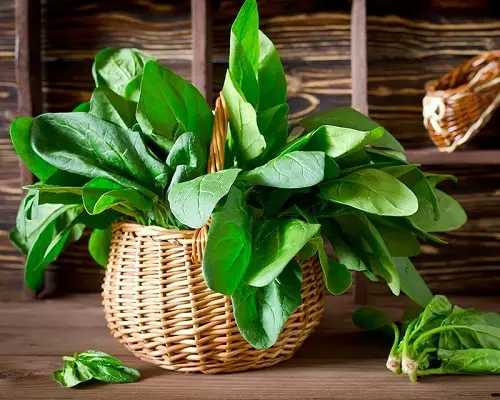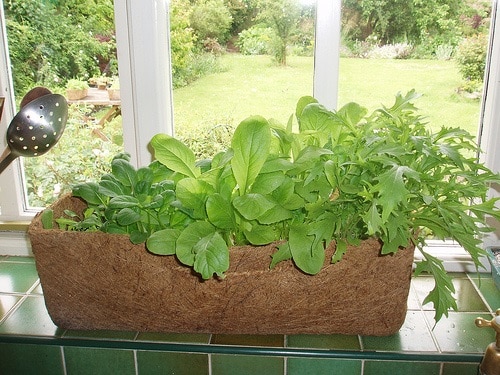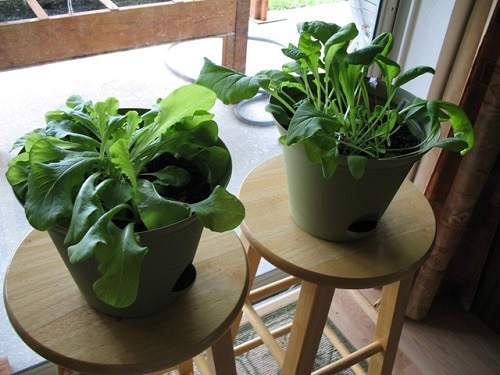Read about the important Things You Should Know to Grow Spinach Indoors for an uninterrupted supply of this superfood year-round!
Rich in iron, spinach is a great source of vitamin A and C, thiamin, folic acid, and potassium. You can grow it in your home, even in small spaces! But before that, be aware of the following Things You Should Know to Grow Spinach Indoors.
Here’s all you need to know about growing spinach in containers
Growing Spinach Year Round

Spinach (Spinacia oleracea) is a fast-growing, cool-weather vegetable and grows in a short period of time, even in the mild weather of spring and fall. It prefers full sun but offers a good harvest in partial shade. Growing it on a windowsill is a great option in urban apartments!
Best Time for Planting Spinach
Start growing spinach in late winter or early spring for fast yield and again in late summer and early fall. Growing spinach in the tropics and subtropics is very easy all year.
Successive Planting
You can grow spinach continuously all year round with successive planting.
Best Indoor Spinach Varieties

- Savory: Bloomsdale has thick leaves and can handle cold very well but needs regular leaf cleaning.
- Semi-savory: It is a great choice for an indoor garden. Tyee (can be grown year-round), Teton, Indian Summer, and Catalina are the best choices.
- Disease-resistant Varieties: ‘Wolter’, ‘Nordic IV’, ‘Melody’, ‘Tyee’ and ‘Olympia’.
- Varieties for Fall Planting: ‘Avon,’ ‘Tyee,’ ‘Razzle Dazzle,’ ‘Melody,’ and ‘Indian Summer.’
- Varieties that Overwinter well: ‘Cold-resistant Savoy,’ ‘Tyee,’ and ‘Bloomsdale Long Standing.’
- Best for Growing in Container: ‘Melody’ and ‘Baby’s Leaf Hybrid.’
Note: In warm, hot climates, spinach begins to bolt soon and starts setting seeds. Hence, while growing spinach in the tropics, go for heat-tolerant varieties.
Propagation
Sow the seeds 1/2-1 inches deep directly in the window boxes or container. The seedlings will sprout in 5-14 days, depending on the growing conditions and variety.
Note: If you have planted seeds in a tray, wait until 2-3 true leaves appear on each plant.
Spacing
Give each spinach plant a space of 3 inches. Provide 5 inches of space for the harvest of large leaves.
Container Size
You can grow spinach in window boxes or 10-12 inch small pot. Don’t go for too deep a pot and pick a wide container instead.
Requirements for Growing Spinach Indoors
Location
4-6 hours of sunlight is fine but remember that spinach bolts in full sun. If you are growing spinach during fall, place the plant in a sunny area (in mild climates). Whereas for spring and summer, keep the containers in an area that has some shade, mainly during the afternoon.
Tip: If you are living in warm climates, keep the potted spinach in a spot with sufficient shade.
Soil
Use a good quality, well-draining potting mix made for indoor plants, rich in organic matter. The texture should be loamy and crumbly with a neutral pH.
Watering
Keep the soil moist but not soggy or wet. Overwatering can lead to rot and fungal diseases. Avoid wetting the foliage and water the plant at a base level.
Temperature
Spinach performs well in the soil temperature range of 50-80 F (10-28 C). Some varieties can tolerate cold temperatures as low as 20 F (-6 C), whereas some plants cannot withstand over 90 F (32 C) degrees.
Spinach Care
Fertilizer
A balanced liquid fertilizer at regular intervals is ideal. You can also feed your plants during mid growth with fish emulsion, compost, or homemade compost tea. Remember that nitrogen is crucial for growing spinach indoors. While planting, blend a time-release fertilizer with the soil.
Mulching
Mulch the container-grown spinach with organic matter–it will help in restoring the moisture.
Pest and Disease
Container-grown spinach plants do not get affected by pests, although, keep an eye on aphids, caterpillars, and slugs.
You can also spray the plants with neem oil solution. It will keep the pests away and help in combating issues like powdery mildew. This remedy is completely safe for edible plants.
Harvesting
The spinach plant can be harvested 36-50 days after germination, depending on the variety and growing conditions. You can harvest when the plant has produced 3-4 inches long, 5-6 healthy leaves.
Tip: Harvest the outer leaves first and leave the inner ones intact so they continue to grow. During spring, you can cut the whole plant from the base and the plant will regrow again.
Best Companion Plants for Spinach

Spinach grows well when paired with given herbs, leafy green or annual flowers:



